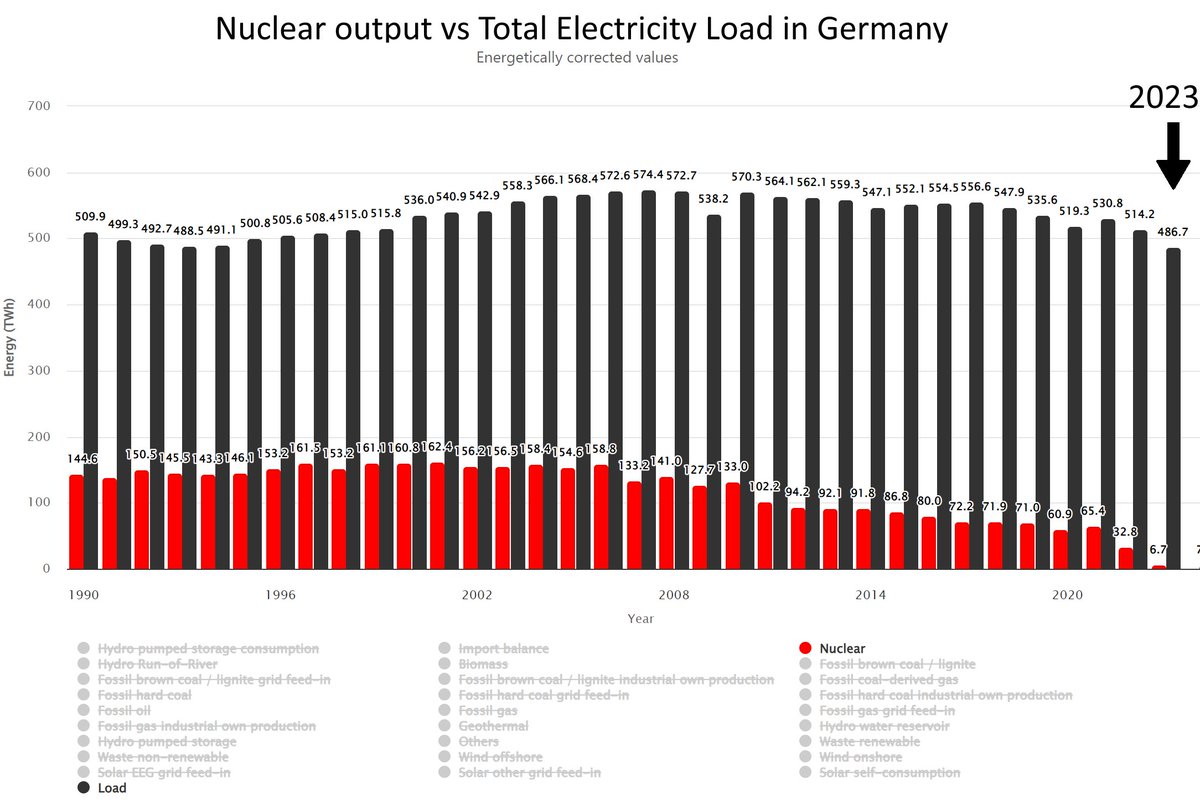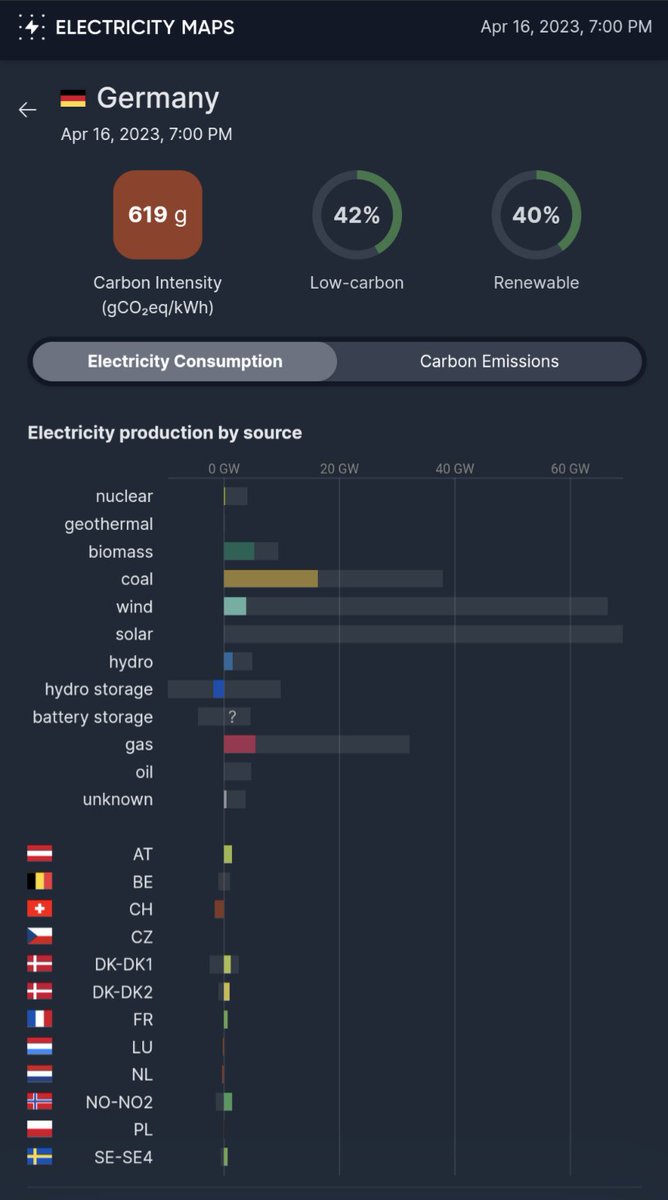Incredible: German electricity demand has fallen to the lowest levels since before reunification in 1990, as its economy falters.
Germany intentionally turned off its extraordinarily cheap and reliable baseload nuclear power, rapidly, during a generational energy crisis.
Putin didn't make them do it.
America didn't make them do it.
Even German public opinion has turned dramatically back in favor of nuclear.
German leaders made this choice, to turn them off and keep them off.
Look at these graphs of annual electricity. It's like Germany is committing WW2-style bombing raids against its own infrastructure.
If Germany were electrifying, for either climate or growth reasons, then we would expect electricity demand to grow, not fall.
We should be seeing all time records in electricity production and demand, not the lowest numbers in over three decades.
Now electricity is too expensive for many industries to justify using for expanding or even maintaining production, so electricity demand is dropping.
But Germany's own generation of electricity is plunging even faster than its demand is, turning Germany from a net exporter to a net importer of power.
Many commenters have celebrated the falling energy costs in Germany for this year and next. But those falling costs are coming along with falling demand for power, not increasing demand.
And costly renewable subsidies are no longer paid directly on power bills, but instead from the national budget, lowering the apparent cost of power even further, which should be stimulating demand.
Yet electricity remains so persistently expensive relative to pre-crisis years that, in combination with expensive natural gas, it just isn't worth it for Germany's major energy consumers.
Germany's courts have, for now, rejected adding more and more subsidies for energy production infrastructure to be paid for by national debt.
Even though this is a crisis for Germany, the courts seem wise in rejecting subsidies for expensive new energy when cheap nuclear plants could just be turned back on.
Leading opposition parties have already stated their intention of restarting Germany's nuclear plants should they win power.
This would take about a year each, but each nuclear plant would prop up a meaningful fraction of Germany's bleeding industrial sector.
In my view, there is no longer any other budget-neutral or budget-positive energy move available to German leaders, without destroying Germany's climate agreements to turn on lignite coal full blast.


Germany intentionally turned off its extraordinarily cheap and reliable baseload nuclear power, rapidly, during a generational energy crisis.
Putin didn't make them do it.
America didn't make them do it.
Even German public opinion has turned dramatically back in favor of nuclear.
German leaders made this choice, to turn them off and keep them off.
Look at these graphs of annual electricity. It's like Germany is committing WW2-style bombing raids against its own infrastructure.
If Germany were electrifying, for either climate or growth reasons, then we would expect electricity demand to grow, not fall.
We should be seeing all time records in electricity production and demand, not the lowest numbers in over three decades.
Now electricity is too expensive for many industries to justify using for expanding or even maintaining production, so electricity demand is dropping.
But Germany's own generation of electricity is plunging even faster than its demand is, turning Germany from a net exporter to a net importer of power.
Many commenters have celebrated the falling energy costs in Germany for this year and next. But those falling costs are coming along with falling demand for power, not increasing demand.
And costly renewable subsidies are no longer paid directly on power bills, but instead from the national budget, lowering the apparent cost of power even further, which should be stimulating demand.
Yet electricity remains so persistently expensive relative to pre-crisis years that, in combination with expensive natural gas, it just isn't worth it for Germany's major energy consumers.
Germany's courts have, for now, rejected adding more and more subsidies for energy production infrastructure to be paid for by national debt.
Even though this is a crisis for Germany, the courts seem wise in rejecting subsidies for expensive new energy when cheap nuclear plants could just be turned back on.
Leading opposition parties have already stated their intention of restarting Germany's nuclear plants should they win power.
This would take about a year each, but each nuclear plant would prop up a meaningful fraction of Germany's bleeding industrial sector.
In my view, there is no longer any other budget-neutral or budget-positive energy move available to German leaders, without destroying Germany's climate agreements to turn on lignite coal full blast.



I have to keep writing this over and over and over again:
France badly mismanaged its nuclear fleet as it tried to foolishly ape German energy policy.
France has had some of worst nuclear fleet availability on Earth.
Germany had among the highest.
France badly mismanaged its nuclear fleet as it tried to foolishly ape German energy policy.
France has had some of worst nuclear fleet availability on Earth.
Germany had among the highest.
https://twitter.com/Montebianco114/status/1743590780856381778
I've been yelling about France's energy self-sabotage for years.
I used the phrase "Vichy Energy" to describe France's policies in this podcast warning about France, Germany, and Nord Stream, from more than a year before the full-scale invasion of Ukraine
decouplemedia.org/podcast/episod…
I used the phrase "Vichy Energy" to describe France's policies in this podcast warning about France, Germany, and Nord Stream, from more than a year before the full-scale invasion of Ukraine
decouplemedia.org/podcast/episod…
How fascinating, two countries that spent years sharing Germany's idiotic energy plan, who started ripping out their own nuclear fleets despite having a much higher reliance on nuclear, are struggling like Germany?
What an astonishing coincidence
What an astonishing coincidence
https://twitter.com/EinarWilly/status/1743698536699412714?t=sMSY53bG6TmRxWsTZD-XMw&s=19
• • •
Missing some Tweet in this thread? You can try to
force a refresh


















